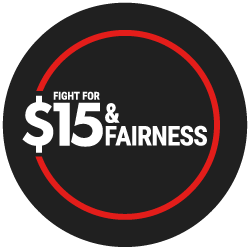Workers’ Rights
Our office provides information, advice and representation to low income workers having problems with their employers or who have been wrongfully terminated.
We can help you with:
- basic rights in the workplace, including unpaid wages, minimum wage, pay for overtime, termination pay, and other entitlements;
- wrongful dismissals; and
- employment insurance benefits.
Please click on the below links for more information:
 Fight for $15 and Fairness
Fight for $15 and Fairness
The $15 and Fairness campaign is fighting to raise the minimum wage to a living wage and to improve the rights of workers.
In May, the campaign celebrated a great success when the Ontario government agreed to increase minimum wages. But the fight is not over. Click the sticker to see what you can do to help!
Recent changes to the Employment Standards Act (ESA) mean workers are entitled to fewer days off and no paid sick days.
This month’s On the Radar talks about these changes, which took effect in January. The ESA applies to most employees in Ontario.
New Rules for Workers Needing Time Off
Personal emergency leave is gone
The new rules replace what was called “personal emergency leave”. Personal emergency leave gave workers up to 10 days off each year to use for themselves or because of the needs of a family member.
No more paid sick days
Before January 1, the ESA gave workers the right to be paid for 2 personal emergency leave days each year, after working for their employer for one week.
And employers could not require workers to get a medical note to prove they needed the leave.
New leaves of absence
As of January 1, 2019, the ESA includes the following short leaves of absence for each calendar year:
- 3 days of sick leave
- 3 days of family responsibility leave
- 2 days of bereavement leave
A worker who has worked at least 2 weeks in a row for their employer may qualify for these leaves.
No right to be paid in the ESA
The ESA now says that employers don’t have to pay workers who take time off for one of these leaves.
But workers might have the right to be paid if they’re in a union or if they have a workplace policy or employment contract that gives them this right.
Sick leave
Workers can take up to 3 days of sick leave if they:
- are sick or injured
- have a medical emergency (a medical emergency includes surgery that a worker needs for medical reasons and sets up in advance.)
Family responsibility leave
Workers can take up to 3 days of family responsibility leave because a family member:
- is sick or injured
- has a medical emergency
- has an urgent matter
Bereavement leave
Workers can take up to 2 days of bereavement leave because a family member has died.
Proving why a worker needs a leave
An employer can ask a worker to prove why they need a leave of absence.
But employers can only require proof that’s “reasonable in the circumstances”. This may include a medical note from a doctor or other health professional.
If a worker needs more time off
A worker might have the right to a longer leave of absence.
For example, they might be able to take:
- family caregiver leave
- family medical leave
- critical illness leave
- domestic or sexual violence leave
- child death leave
- crime-related child disappearance leave
- organ donor leave
- reservist leave
If an employer does not follow the law
When an employer does not follow the ESA, a worker may be able to complain to the Ministry of Labour. This is called making a claim.
For example, a worker may be able to make a claim if their employer:
- owes them money
- punishes them for asking the employer to respect their rights, including the right to take a leave that they qualify for
Getting legal help
Steps to Justice has information about:
Last updated February 1, 2019